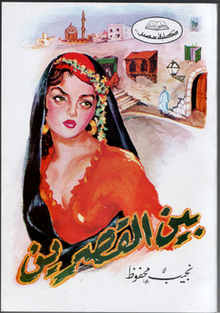Cairo Trilogy

Cover of a recent edition of Palace Walk
|
|
| Author | Naguib Mahfouz |
|---|---|
| Original title | ثلاثية القاهرة |
The Cairo Trilogy (Arabic: الثلاثية (The Trilogy) or ثلاثية القاهرة (The Cairo Trilogy)) is a trilogy of novels written by the Egyptian novelist and Nobel Prize winner Naguib Mahfouz, and one of the prime works of his literary career.
The three novels are, in order:
The three novels' Arabic titles are taken from the names of actual streets in Cairo, the city of Mahfouz's childhood and youth. The first novel, Bayn al-Qasrayn, is named after the medieval Cairo street in the Gamaliya district where the strict socially conservative protagonist, Ahmad 'Abd al-Jawad, and his family live. The second novel, Qasr al-Shawq, is named after the street where his eldest son Yasin and his family live, whereas the third, Al-Sukkariyya, is named after the street where his daughter Khadijah and her family live.
The trilogy follows the life of the Cairene patriarch Al-Sayyid (Mr.) Ahmad 'Abd al-Jawad and his family across three generations, from 1919 – the year of Egyptian Revolution against the British colonizers ruling Egypt – to almost the end of the Second World War in 1944. The three novels represent three eras of Cairene socio-political life, a microcosm of early 20th century Egypt, through the life of one well-off Cairo merchant, his children and his grandchildren.
To Kamal, 'Abd al-Jawad's youngest son, Mahfouz admits that he gives him some features of himself, as they both have got a BA in philosophy from what is now the University of Cairo and have problems with profound contradictions they discern between religious principles and the scientific discoveries of the West.
Seen as a child in the first novel, a university student in the second, and a teacher, not married, in the third, Kamal loses his faith in religion, in love, and in traditions and lives in the second and third novels as an outsider in his own society. He keeps searching for meaning of his life until the last scene that seems an imposed one by Mahfouz to give some air of hope. Then Kamal's attitude to life changes to the positive as he starts to see himself as 'idealistic' teacher, future husband and revolutionary man.
...
Wikipedia
